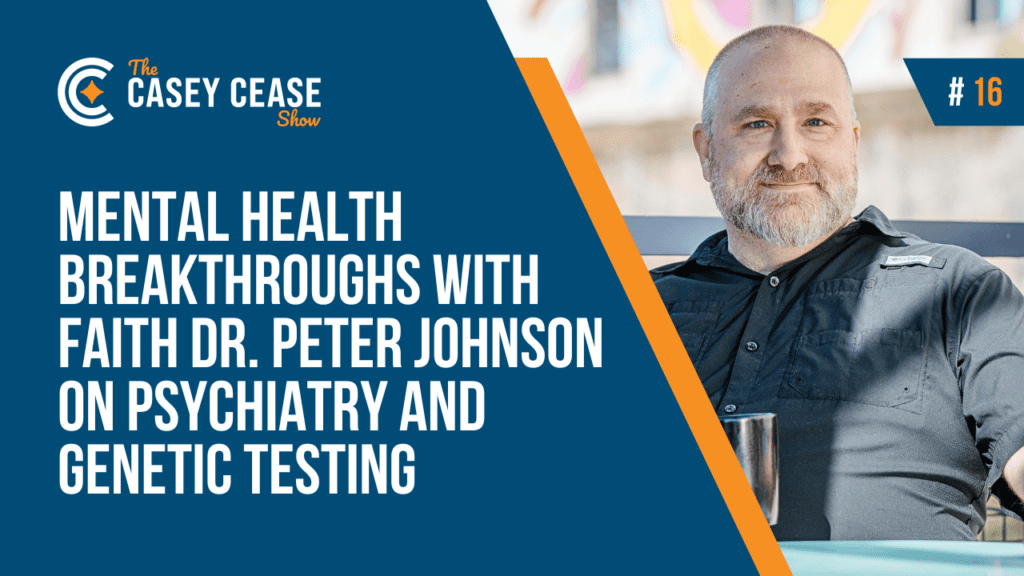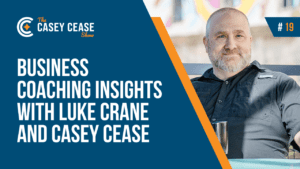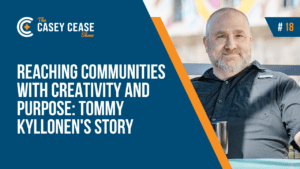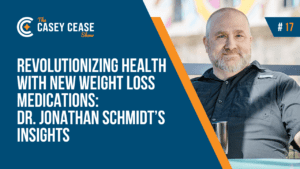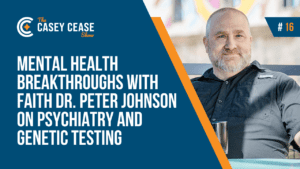[00:00:00] Welcome to the Casey Cease Show. Casey is your entrepreneurial guide. Dive into weekly insights that blend inspiration with practical strategies to grow your business with integrity. From boosting sales to building strong relationships, Casey shares the essentials to help both your venture and personal dreams flourish.
Ready to elevate your entrepreneurial journey? Let’s dive in.
Casey Cease: Hey, everybody. Welcome back to another episode of The Casey Cease Show. I’m here with a good friend of mine, Dr. Peter Johnson. And not only is Dr. Peter Johnson, a friend, he’s actually my psychiatrist. And so, you might be saying, Casey, why are you telling everybody you have a psychiatrist?
Well, I have a book out that speaks about those issues. I speak about it candidly when I’m speaking, sharing my story, or preaching, or public speaking. And it’s one of those things where, there’s been a lot of freedom through my faith in Jesus Christ, but also through understanding, how I’ve been wired and some of the. issues that I [00:01:00] have, and really learning how to deal with them.
And, I’m a huge fan of Dr. Peter Johnson. I sent a lot of people his way, even from Brenham. He’s in the North Houston area. We have people in our church that we send to his practice down there to receive help. One of the things I love about Peter is that, he loves the Lord, and he loves his patients, and he really cares, but he’s also not someone that just wants to randomly medicaid people, but actually thinks through it.
I remember, when I first went to see him in 2015 for some stuff called ADHD. Turns out, I actually, legit have it . And when I first started talking with him, it wasn’t just here, let’s, push some pills and good luck. It was, what’s going on with you? What’s going on with your soul? What’s going on in your mind? Hey, are you taking fish oils? How’s your diet? How’s your sleep? How’s all these naturopathic issues that I do have some influence over?
And so today, I wanted to bring Peter on. The reason why is, Peter is a very interesting gentleman, a friend of mine, but also, he’s an entrepreneur business owner. He owns his own practice in the Woodlands area, North Houston.
But also, he has done a lot of [00:02:00] innovative things, regarding genetic testing and DNA. Um, And so Peter, why don’t you just take a minute and tell us a little bit of your background. And like I shared with you before recording, I want to hear your story and your journey through this.
And then, we’ll dig in a little bit on the advances you’re seeing take place in psychiatric medicine.
Peter Johnson: Sure, you Casey. And I appreciate the kind words. So, I’m actually from Dallas. And ever since I was born, my dad told me that it was my destiny to become a doctor. I think, he was trying to live vicariously through me. He and my brother are lawyers, so I was kind of the black sheep.
So, I went to medical school. Actually, wanted to do Neurosurgery. But I also thought in the back of my mind that psychiatry might be a better fit. And studied neuroscience. And just through a series of important events, I really felt like God ended up leading me to psychiatry.
And really put a burden on my heart to counsel people, in addition to just treating them from a medical standpoint. So I went to a Baylor College of Medicine. And really, as my practice was growing, I was realizing, it’s like, man, there sure is a lot of trial and error. Not just in psychiatry, but [00:03:00] frankly, just in medicine in general. And I’m thinking like, man, there’s just got to be a better way.
Right? I don’t know, a little over a decade ago, genetic testing started to kind of hit the scene. And this is certainly nothing we ever learned in med school or residency. And everything I had learned, I pretty much had to learn on my own, as we all did. And what I found was that, with genetic testing, it gave me kind of like an MRI of the brain.
It kind of gave me a little bit closer look into, what was actually going on from a biological standpoint to try and minimize, not eliminate, but at least minimize some of that trial and error, so that instead of just you know, looking at my drug rep pen and saying, Oh, Zoloft. Here’s some things in Zoloft, Mr. Smith. I could actually say, Hey, Mr. Smith, based on your genetics, I’m going to recommend a trial of this over this. So, pretty cool.
Casey Cease: That’s amazing. And one of the things, you know, I think people, especially in the church, those of us who have been in ministry leadership, I think sometimes psychiatry can get a bad rap. And I’m just wondering, as you having been a believer going to medical [00:04:00] school, practice psychiatry, how have you navigated those waters because you’ve done so well. Because you’re not exclusively, we only treat Christian patients, but you are a faith led man.
How have you navigated those waters of understanding, kind of, you know, what the word of God says, what the Bible teaches, and what science teaches? have you navigated that?
Peter Johnson: Yeah. It hasn’t been easy, but the flip side is, it has been easy. So, it hasn’t been easy because there’s this sort of perceived, if it’s either A or B, right? And we know that we are body, mind, soul, and spirit. you know, We’re not just a lump of cells. Most people would agree with that, right? That there’s something deeper about ourselves, our psyche, our soul, our personalities, the fact that we can love, and experience you know, deep emotions.
For me, it’s been, how do we truly see this patient, see a life transformation? And you can’t get that with a pill.
So, what I found is that, the deeper you can look for a root cause, like what’s really going on, then in that sense, the easier it becomes. Because then, I’m [00:05:00] not putting all of my faith in a pill to try and fix everybody’s problems.
I remember, I had one guy come in, this is many years ago. And he was acutely suicidal and completely distraught. And I think, a lot of other doctors would have been seemingly justified in putting this guy in a lot of medicines, or, putting him in the hospital or something.
Right. But I really feel like the Lord is putting on my heart. like, Just listen. What’s really going on with this guy? And in that initial appointment, he revealed to me that basically, the underlying issue was, he had bought a house from someone. And he had sold his house to someone, and had not disclosed that had a history of termites, even though there were no active termites. But he felt so guilty. He was a man of God also, and he just had this conviction.
He’s, man, like I did not disclose that. And it was killing him. He was rotting him out like cancer. So what I actually did is I said, you know what? We’re going to call that guy, right now on the phone. So in the session, he was like, really? I’m like, yeah. So we [00:06:00] called it, we called the buyer of the guy’s house.
And he basically just said, look, I just want to disclose to you that our house had a history of this. Long story made short, the buyer was like, I still want the house. And my patient was like, I’ll buy it back from you if you would like, just cause he just needed that out of his soul.
And anyway, so the buyer was like no, no, no, I want the house. And after that one conversation in my office, the letdown of just the burden, and the stress, and the anxiety, and the depression, and the desire to just kill himself just went away. And you know, I’ve talked to him a few times since then, because I’ve kind of gotten to know him a little bit, and he’s got a little bit of anxiety. sure, But I mean, nothing like what he had, right?
And felt, like, had I not listened to that spirit within me saying, hey, just listen to the guy instead of just jumping to a conclusion, because you’re so smart. It’s like, I would have missed it. you know?
Casey Cease: So, you’re not just a solo practitioner, right? You have your own practice and it’s not a tiny practice. And I remember, when I first came and started seeing you less than a decade [00:07:00] ago, the summer will be nine years. You were in a building and had a few counselors in there, and it was Peter Johnson, MD and all this kind of stuff.
So, how did you go from graduating medical school to obviously practicing psychiatry, to now having a life spring behavioral health, where you’re offering many different services? Walk us, cause a lot of people who listen to the podcast or watch are also either business owners, or are entrepreneurs, or want to become entrepreneurs.
And what I love about your story is like you were great at your trade, but you also learned along the way how to do business and run business.
Peter Johnson: that’s actually a cool story. So when I finished residency, I was trying to figure out, okay, where am I going to go? And I was looking at some office space and decided to you know, stay in the Woodlands area. And we toured this black glass building, and it was a corner office. And I was thinking, man, like, this is going to be great. You know, Like I’ve heard this.
And I get ready to sign the [00:08:00] lease. And my leasing agents, who all I needed from me was a signature to get a big fat commission for a big five year lease, he said, Peter, don’t sign the lease, walk away. And I was like, what? And he’s, like, I don’t like this guy. I don’t trust this guy. Just walk away.
But I’ve got nothing else. I don’t know where else to go. And he’s like, I don’t know, man, you’ll figure it out, but I would not sign this lease. I was like, okay. So I didn’t sign the lease. I had nowhere to go within, I honestly think it was like 48 hours.
This crazy psychiatrist, Dr. Looney, that I had had, lunch with six months before, who’s a psychiatrist in the Woodlands. He had a practice called Whitestone. He’s like, Hey Peter, remember me? You know, We had lunch six months ago. Did you ever find any office space? And I was like, actually, no. So anyway, so he’s like, come join me at Whitestone.
And it was a, you know, a home, in the kind of the Spring Woodlands area that had been converted into a small business, handful of therapists. And so I joined him. And he became kind of like a mentor to [00:09:00] me and deep friend. So it was there that they helped me start my practice. And had I gotten what I wanted, which was that flashy glass building. I would have been by myself in a silo, trying to build a practice in a new city from scratch. But with Dr. Looney’s help, and with the group that I started with, it was such a blessing in disguise that I didn’t get what I wanted, because this ended up being exactly what I needed.
So, grew my practice, and he introduced me to people in the community. I’ll forever be grateful to him. And I eventually, was able to carry that baton of Whitestone. And then ended up building a building.
And then, we, grew that into a number of different practitioners and therapists. And then from there, I started LifeSpring where I’m at now. And was the director of both of those, in parallel for two or three years. And then, passed on the baton of Whitestone, and now I’m just running Lifespring.
Casey Cease: So now that LifeSpring is up and running beyond the genetic testing, what all do [00:10:00] you specialize in now?
Peter Johnson: Yeah, so I personally work with adults. My passion is working with business owners and executives, but I, see anybody and everybody. Anxiety, depression, ADHD, bipolar disorder. But my colleagues see anybody and everybody in a lot of different ages. They offer family counseling, individual counseling. We also offer addiction medicine, addiction counseling, etc.
So, it’s really been a, humbling honor for me to work alongside an amazing group of people.
Casey Cease: Yeah. It’s been an amazing, just watching you grow. Watching it scale and grow, and, and, you have challenges like any business owner does. But one of the things that I always tell Stephanie is, like, Hey,
can your regular doctor prescribed medication? You’re stable and it works and all that. I was like, yeah, but I get coaching. Peter’s my buddy, and you’re a great coach. You actually dig in with your patients, and help, and you know, we always have struggles along the way.
As you grow in your career, and you not only practice medicine, but [00:11:00] you also I know with a select few high end clients, you’ve done some coaching on the side. What’s that experience? Because I mean, you’re not just prescribing medication to these folks. You’re actually helping pull out high performance. What are some common themes you’ve seen with high performing executives that you really are able to take to the next level?
Peter Johnson: That’s a great question. I think a lot of times, it’s, helping them get out of their own way. I mean, These are people that, they know what to do. They’re obviously smart, they’re obviously successful. And it’s trying to figure out, again, is there some pattern of maladaptive behavior? Is there some personality trait that they have that keeps tripping them up? Is it a relationship stressor that keeps coming up in their personal life, as well as their business life? Because a lot of times, even if they can’t figure out in the business setting, what it is that keeps resulting in, losing clients or having friction with employees? If I can figure out, okay, so is there a pattern on the personal front, [00:12:00] interpersonally, etc, then a lot of times we can translate that to the business world, as well.
Casey Cease: That’s highly impactful. As my career has grown and my businesses are grown, I’ve had the privilege of, of coaching several high end executives, and there’ve been some that I’ve sent over to you. And they’ve been greatly benefit from your experience.
Ready to skyrocket your business and truly connect with your audience on a whole new level. Unleash the power of your story with Lucid Books. Imagine transforming your insights and experiences into a captivating book that not only cements your status as a thought leader, but also weaves a strong bond with your ideal clients at lucid books.
We’re more than a publishing house. We’re your creative partners on a journey to turn your wisdom into a masterpiece that speaks directly to the hearts and minds of your audience. Join forces with us and let’s embark on this incredible adventure together. Your story has the power to inspire, engage, and elevate.
Are you ready to share it with the [00:13:00] world?
Casey Cease: As you continue on your career path, as you dig deeper into genetic testing, I love what you said about the genetic testing that, you want to be more precise in what you do. And that the pill in and of itself isn’t what helps the person, that’s not all that’s needed. There’s a lot more that goes into it.
One of the ways I explained it to a friend of mine who was struggling that I was encouraging to talk to someone was that, it’s not just popping a pill and everything’s better. It’s basically, utilizing that to be able to form better habits to help overcome some of those obstacles, so that you can find a way forward that is life giving and redemptive.
I remember talking to a pharmacologist in my early 20s. I was five, six years into my faith, and I felt guilty for having needing any medication, whatsoever. And he said, what if you started doing that as a mercy rather than a condemnation? That there are some residual effects from the fall that make us struggle with various things, but rather than seeing it as a judgment on [00:14:00] you, why don’t you see it as God’s mercy and grace?
And you know, I know, there’s a lot of pastors out there that think that all medications bad or any sort of treatments bad. But really, when you look at the opportunity to help a person grow in, and think better, and do better. I tell people all the time in my story, when I was diagnosed with ADHD, I was about to drop out of college.
And then, a doctor was like, cause I was using a bunch of like over the counter stimulant stuff, caffeine pills, all that kind of stuff. And I said, that’s the only time I can really focus. Cause I had no idea what Ritalin or anything was. I didn’t know that it was stimulant. And so, our medical doctor at the time, friend of the family was like, why don’t you try this?
And he put me on some Ritalin and all of a sudden, I started focusing. Then I went to a specialist, Oh, by the way, you’re dyslexic. And so, I started doing retraining on how to read and comprehension. I ended up graduating from college with honors. And then, going to seminary and doing very well, and starting a nonprofit ministry starting companies.
And, so, it’s, I don’t bow down and worship the pill. I thank God for the fact that my brain’s wired a little [00:15:00] differently. And there are resources and tools I can use to grow and improve.
And so, as you navigate the sacred secular, as you go through as a physician, you deal with your scientists as well, you deal with faith, what are some common objections you found, whether they’re in the Christian faith or outside of it, objections people have for humbling themselves and going to ask for help?
Peter Johnson: Yeah,
Casey Cease: so, I mean,
Peter Johnson: that’s, what I see all the time is, there’s this belief that the brain is somehow unique from the other organs, or that the mind isn’t a product of the brain. right? Now, as believers, we believe we have a soul, etc. Not referring to that right now, but there’s not an organ in the body that doesn’t have a textbook written about all the different problems that can happen with it. So, why is the brain any different, right? Like Nobody has any problem taking a medicine for their blood sugar, or you know, semi glutide for weight loss, or a thyroid supplement, if their thyroid’s low, like there’s no concern at all, right. or birth control pills or whatever.
Like But when it comes to treating some sort of a mental health condition, then it’s all of a [00:16:00] sudden, like, Oh, well, you shouldn’t need that. You should just pray more, or you should just try harder or whatever.
Right. The brain is, it’s a lump of tissue. It’s a lump of cells. And it’s not immune to problems. Interestingly, if someone had a seizure disorder, or a brain tumor, nobody would have any problem with them taking any medication for those, right? I like to think of it like hardware and software.
Think about it, if you had the flu, and you just felt utterly miserable, and you go listen to a TED Talk or a sermon or whatever, how much are you really going to absorb when you feel terrible, right? So similarly, if someone has so much anxiety, or so much depression, or so much inattention that they can barely function, like they’re losing jobs, and they’re dropping out of school, etc., etc., then even great counseling is going to be of limited, not no, but limited benefit if they can’t implement what they’re learning in the counseling or the coaching, right?
So that’s where, if someone’s struggling enough, and I’m not saying [00:17:00] everybody needs medication, right? But if someone’s struggling to a significant degree to where it’s adversely affecting their ability to do what they’re called to do, then that’s where, let’s address their hardware, medically. And medically could be medication, could be supplements. And as you already alluded to, I’m really big into like, nutrition and exercise, etc., but let’s treat the body.
And then, once they’re able to better implement strategies, then now, let’s load that new software that new iOS, right?
Casey Cease: Yeah, that’s been key. And I think, just my prayer is that someone listens to this, a business owner, a ministry leader or something, if they’re struggling, that they would have courage to ask for help. And it’s such a wonderful way that you put it. And I’ve heard you use hardware software analogy before when I’ve said to you, like, shouldn’t I be at this place? Maybe, but we’re not there right now. And so, let’s keep going along the way.
So, As we enter into time, this recording is 2024. We’re post the Pandemic and things like that. What are some things I’m [00:18:00] asking a lot of,
specialists I, bring on, what are some cultural or relational shifts you’ve noticed coming out of the pandemic that maybe leaders are having to be aware of, whether it’s pastors and their churches, or you know, management or business leaders and their staff? But what are some things that you’ve been noticing coming out of that time period?
Peter Johnson: Yeah, it’s a great question. So definitely, there’s less stigma now than I think ever before with respect to getting mental health. And I’ve noticed that a lot more companies are more amenable to employees receiving, either services for mental health, or being able to take time off for mental health, etc.
So that’s been a positive overall shift. And obviously, the hope is that will continue to gain acceptance with the ultimate goal of mental health being treated with just as much importance as medical health, which anyone who’s ever struggled with any type of mental health will certainly be able to attest to.
Casey Cease: Absolutely. That’s great. So, what’s coming next for Lifespring and for Dr. Johnson? What’s coming down the pipeline for you?
Peter Johnson: That’s a great question. [00:19:00] So, we are continuing to expand our team. We are looking for a child and adolescent psychiatrist that is not only biblically grounded, but also medically very conservative and sound. I remember, when I was going through my residency, and I would have to You know, work at different hospitals and I did a lot of moonlighting. There were so many kids that were just given all these diagnoses, and put on all these pills, and a lot of them were wrapped up in the foster system, and you know, just really hoping to find the right clinician that will treat kids like I would want my own children to be treated if they needed that kind of help, right?
Someone that was, going to really look for root causes, and not just throw pills at potentially behavioral issues. Right.
Casey Cease: Yeah. That’s great, man. So, I always like to ask this question as I wrap up. What question should I have asked you that I haven’t asked you yet?
Peter Johnson: Oh man. I don’t have that. That’s good. I don’t know. I don’t have a good answer to that. I feel like we’ve covered lot of great stuff.
Casey Cease: Because sometimes, when I say that on the show, people are like, Oh, you should ask me blah, blah, blah, blah, blah. And I’m like, And now’s your chance. Let’s talk to it. No, [00:20:00] Having been in pastoral ministry for so many years, are many similarities to how you conduct your practice, right?
You’re not just churning people through, writing them a script and moving on. You genuinely care for your people. You pray for your people. You love on them. And I’m grateful. My family’s grateful. My congregations, I’m sure are grateful, and people that don’t even know they need to be grateful are grateful for the way that you care for people who love the Lord and want to do great, but their brains sometimes have a little bit different agenda.
And you know, another thing, my pharmacology friend said, he’s like, Casey, aren’t you wearing your contacts right now? I said, yeah, man. Cause everything’s blurry. He’s like, that’s the point, right?
Grateful for you, grateful for your friendship and all that you do. Where can people find you online?
How can they find you or your practice to know, you understand the dopamine addiction that happens from the socials? So I know you don’t spend a ton of time on social, but where can people find you online?
Peter Johnson: Yeah. So, our website is Life, L-I-F-E LifeSpringBehavioral.com.
Casey Cease: Okay. LifeSpringBehavioral.com. [00:21:00] And so, they can find out anything they know there. And if they’re in the North Houston area or Texas, and they want to jump in their private jet and come down and visit with you, I know, you’d be glad to visit with them.
Well, Peter, thank you so much for coming on the show. And I’m sure, we’ll be having you on again, sometime in the future.
Peter Johnson: Thank you, Casey so much.
That wraps up this episode of the Casey Cease Show. Make sure to visit our website, thecaseyceaseshow.com, where you can subscribe to the show on iTunes, Spotify, or via RSS, so you’ll never miss a show. While you’re at it, if you found value in this show, we’d appreciate a rating on iTunes, or if you’d simply tell a friend about the show that would help us out too.
You might also want to check out our book for business consultation available at lucid books or double your sales strategy session at planify agency. Be sure to tune in next week for our next episode.
